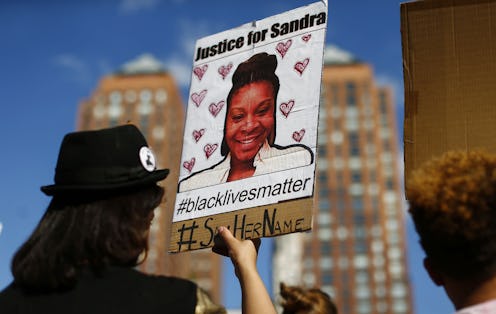News
How To Honor Sandra Bland One Year After Her Death
Wednesday marks one year since the death of Sandra Bland, the 28-year-old black activist who died in a Texas jail while in police custody. Bland's story captured the attention of the nation. Millions joined together to voice their grief, anger, and frustration over her death. One year later, many of those voices have faded, but the weight of Bland's death still feels just as heavy. Remembering her on the anniversary of her death doesn't ease the burden, but it's worth it, because it's what she would have done if anyone else had been in her place. The key to honoring Sandra Bland is speaking out the way she did, being a dedicated and vocal advocate of black lives and trying to make the world a brighter place.
Bland was an intelligent, energetic college graduate who was in honors society, marching band, and a community service-oriented sorority. Living in Texas, a state that relies on money through things like traffic tickets, high fees, and court costs, Bland was pulled over again and again, and slapped with so many fines that she had to go to jail because she couldn't afford to pay them. Once she had a misdemeanor on her record, on top of being a black woman, it was nearly impossible to get a job. The struggle of being targeted repeatedly by police and seeing her once bright future drain away from her wrecked Bland's emotional health, sending her into a spiral of depression from which she never really had the chance to recover.
The light near the end of her life was her newly awakened interest in activism, which she primarily promoted through her video project, #SandySpeaks. She started every video with a signature greeting, “Good morning, my beautiful kings and queens!” Bland used social media in the best way possible. She was active and vocal about issues she cared about, she wanted to lift others up, and she tried to be open and honest about her struggles with mental illness. She was surviving, trying to get her life back on track. She was excited about her new job at her alma mater, and she was making a concerted effort to deal with her depression. And then she died in a jail cell, with none of her loved ones by her side and no more chances. Over a speeding ticket.
Don't forget. Say her name. Keep asking why, and how you can fix it. Reach out, speak out, act out. Do what you can to make sure this doesn't happen again. She's your loved one now, she's your sister, your best friend. Fight for justice for her and the community she loved. Her fight isn't over because she's gone — it's up to you now to carry it on.
